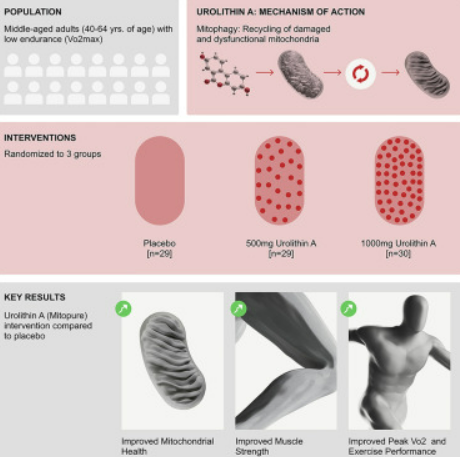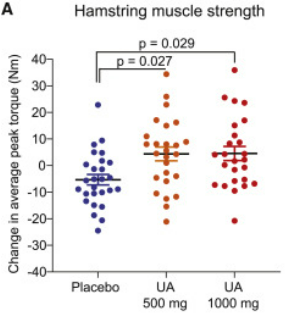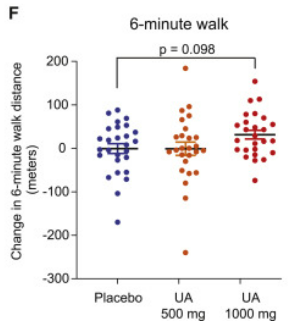Urolithin A Enhances Physical Performance in Overweight Adults
A clinical trial indicates that urolithin A improves muscle strength, exercise endurance, and cellular markers of mitochondrial health in overweight adults.
Highlights
- Four months of urolithin A supplementation increases muscle strength by 12% in overweight adults.
- Overweight adults treated with urolithin A exhibit a gain in walking capabilities following supplementation.
- Molecular markers of mitochondrial health linked to aging improve after urolithin A supplementation.

Dietary supplements to improve cardiovascular, neurological, and muscle function have become a hot topic as people seek to extend the number of years they live in good health. A few popular anti-aging compounds like NMN, NR, and niacin boost nicotinamide adenine dinucleotide (NAD+) levels to enhance metabolism and DNA repair mechanisms. Another supplement coming to light is urolithin A, derived from foods like pomegranates, berries, and walnuts, that targets the recycling and cleanup of deteriorating mitochondria. As the data on these supplements accumulates, we must look at how long-term usage of each influences physical performance to determine which types work best.
Published in Cell Reports, Rinsch and colleagues from Amazentis SA in Switzerland demonstrate that four months of supplementing overweight, middle aged adults with either 500 mg or 1,000 mg of urolithin A per day substantially improves their physical performance. The Swiss research team found that urolithin A increased hamstring muscle torque by 12%. Urolithin A also increased the distance participants walked over a six minute duration. Additionally, the researchers showed that urolithin A supplementation significantly increased the abundance of enzymes required for the recycling and degradation of dysfunctional mitochondria. This study is the first to show that urolithin A improves muscle strength and exercise performance by stimulating mitochondrial elimination in overweight individuals.
Urolithin A Improves Physical Performance
Muscle strength is a key indicator of physical function, so Rinsch and colleagues examined leg muscle strength in overweight middle-aged adults. The research team found that four weeks of urolithin A supplementation increased hamstring torque by 12% and knee flexion torque by 10.6%, showing profound strength gains.

To find whether the increased strength observed in the overweight adults translated to improved exercise performance, the Swiss researchers measured their maximum walking distance over a six-minute period. They found that the higher dosage (1,000 mg per day of urolithin A) group was able to traverse a substantially longer distance (110 ft) than overweight participants not given urolithin A. These findings are the first to show that urolithin A enhances physical performance in overweight, middle aged adults.

Urolithin A Increases Abundance of Enzymes that Degrade Dysfunctional Mitochondria
To determine what cellular changes drive enhanced physical performance following urolithin A supplementation, Rinsch and colleagues measured protein abundance. They found that enzymes involved in dysfunctional mitochondria recycling and degradation were substantially more prevalent in cells after urolithin A supplementation. These findings corroborate previous studies showing that urolithin A enhances mitochondrial health and show that it does so by stimulating dysfunctional mitochondria cleanup.
Comparing Physical Performance Enhancing Supplements
Previous research has shown that urolithin A increases mitochondrial abundance in muscle, but this study is the first of its kind to show that it can improve physical performance. This draws into question whether supplementing with other anti-aging molecules can enhance physical performance. Indeed, one study showed that the NAD+ precursor, nicotinamide mononucleotide (NMN), improves cell oxygen utilization and endurance in long distance runners. However, this was in healthy individuals, so comparing the two compounds remains difficult. Weighing which of these supplements is more beneficial for physical performance will require researchers to look at NMN’s effects in overweight participants and/or whether urolithin A positively impacts healthy long-distance runners.
Model: Human
Dosage: 1,000 mg per day of urolithin A

